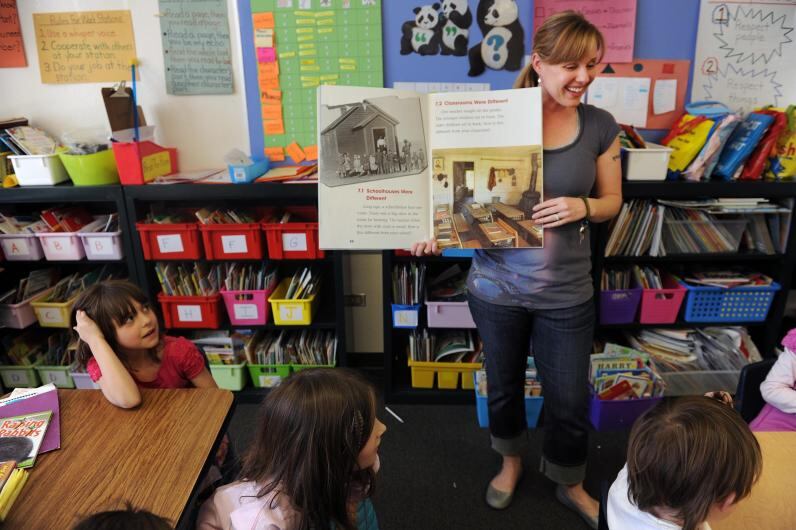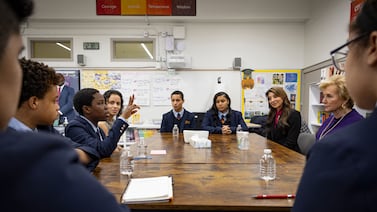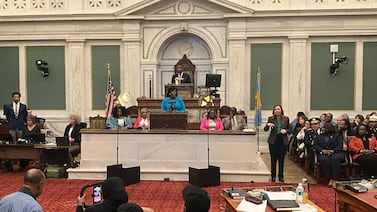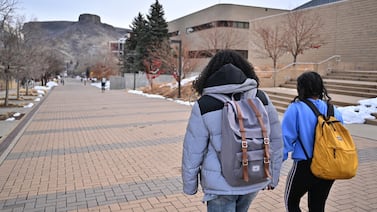Colorado’s largest teacher preparation program hasn’t done enough to change how it trains future educators on reading instruction.
That’s the conclusion of state evaluators who recently reviewed the University of Northern Colorado’s teacher prep program, a year after they first delivered a harsh critique of the program for its failure to adequately prepare students to teach children how to read.
In a report released Monday and scheduled for a State Board of Education vote Thursday, the evaluators praised progress in the university’s special education program, but cited continued shortcomings in its elementary education and early childhood education programs. They recommended those two programs receive only conditional reauthorization and undergo another state review next spring.
The recommendation — if adopted by the board — means the university’s teacher prep program won’t earn the state’s highest seal of reauthorization approval for the second time in 16 months, and will face another time-consuming review in a year. It won’t prevent the university from admitting students to its teaching program.
The state’s crackdown on teacher preparation programs, specifically their approach to reading instruction, is part of a larger push by lawmakers, state education officials, and parents of students with dyslexia to get more Colorado children reading at grade level.
Despite millions of state dollars spent on struggling readers since the passage of a major 2012 law called the READ Act, only about 40% of third-graders are reading proficiently — and many experts fear changes related to the coronavirus pandemic could make things worse.
Corey Pierce, associate dean of the College of Education and Behavioral Sciences at the University of Northern Colorado, said he wasn’t surprised by the state’s latest reauthorization report and has no fundamental disagreement with its findings.
“We understand their job is oversight and to make sure we do have strong educator preparation programs in the state,” he said. “We see the value in collaborating with them and getting this right.”
Pierce said the university has already launched a new committee to oversee reading instruction changes and will likely add a new foundational reading course and adjust other courses as well. He said altering courses and course sequences requires a monthslong internal approval process that can take a semester or more.
“In higher education, these things take time,” he said.
About 20 faculty members work in the University of Northern Colorado’s elementary education and early childhood education tracks, which together serve about 700 students. Most of the institution’s more than two-dozen other tracks — from school psychology to secondary math education — enroll fewer students. All are slated to win full reauthorization.
The Greeley-based university was the first to face extra reading scrutiny when the state reviewed its teacher prep program in 2018-19. Fort Lewis College in Durango was the second, winning a full reauthorization earlier this spring. State officials are currently reviewing Metro State University of Denver, the state’s second-largest teacher preparation program, with the final report possible in August.
There are four possible reauthorization outcomes: Full reauthorization, conditional reauthorization, probationary status, and not reauthorized.
In February 2019, the state first weighed in on the University of Northern Colorado’s approach to reading instruction, faulting it for failing to adhere to state standards that emphasize the science behind reading instruction. Instead of a full reauthorization for five years, the state gave it a conditional authorization, outlined several steps for improvement, and ordered a follow-up review this year.
But state evaluators found little had changed during this year’s review.
The elementary education and early childhood tracks hadn’t increased time spent on scientifically based reading instruction as the state had directed, the reauthorization report said. For example, the main elementary education reading course still includes only 15 hours of class instruction on several fundamental literacy topics, including the science of reading. Students spend the other 30 hours in field placements.
“Our legislature, our State Board of Education have taken a very clear stance … that we are a scientifically based reading state and that is the best way to teach children how to read,” said Colleen O’Neil, associate commissioner of educator talent at the Colorado Department of Education.
Like the original reauthorization report, this year’s report also reiterated that some faculty members don’t understand the importance of scientifically based reading instruction or the requirements of the READ Act. The report said the state will provide training on those topics for faculty.
O’Neil said in any profession, training can help employees identify blind spots and fill knowledge gaps. Even “million-dollar quarterbacks” with years of experience benefit from having a quarterback coach, she said.
O’Neil said state officials have increasingly noticed that faculty in both teacher preparation programs and K-12 schools incorporate science-backed approaches to reading instruction in interventions for struggling readers, but not as much in instruction geared for all students.
“That’s one of the hard shifts,” she said. “Folks really do believe that they use some scientifically based reading instruction, but it’s often not their core.”
She said science-backed approaches to reading instruction must be the main tool in a teacher’s toolbox, not just one option of many.
Pierce said the university wants to do a good job preparing future educators to teach reading, but noted that the state’s critique applies to only a sliver of its programs.
“We get it,” he said. ”This is very important, but in the scope of all we do in educator preparation at [the University of Northern Colorado] and the thousands of students who go through our programs, we feel the reauthorization process has shown we’re a strong program.”







